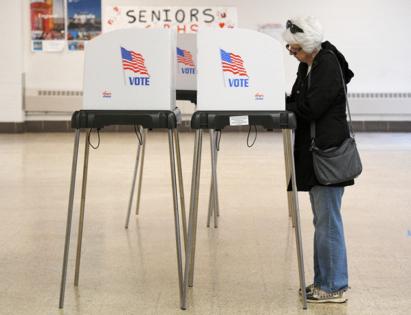What Trump's executive order on elections could mean for Maryland
Published in News & Features
President Donald Trump issued a sweeping executive order this week calling for changes to U.S. elections, including requirements for people to prove citizenship when registering to vote and to have ballots be cast and received by Election Day.
National voting rights groups have railed against the order, calling on officials to reject it and pointing out that it could disenfranchise millions of voters.
David Levine, a senior fellow at the University of Maryland’s Center for Democracy and Civic Engagement, said that several parts of the executive order are on “legally slippery ground.”
“I don’t have the crystal ball, but I’d be stunned if there were no legal challenges here,” he said in an interview Friday. “I think this executive order, on its face, upends the administration of elections on a number of fronts.”
The U.S. Constitution grants states, not the federal government, the power to set the “times, places, and manner of holding elections.” However, Congress has acted to ban discrimination in voting rights, such as the 1965 Voting Rights Act.
One provision of Trump’s executive order, issued Wednesday, would require the Election Assistance Commission to update the federal form used to register U.S. citizens to include a requirement to provide proof of citizenship, such as a U.S. passport, within 30 days from when the order was issued. State or local election officials would also have to record the type of document a person provides.
People across the political spectrum could face challenges finding the required identification to register to vote, Levine said.
A survey conducted by the Brennan Center for Justice, the University of Maryland Center for Civic Democracy and Engagement, VoteRiders and Public Wise indicates that more than 21 million eligible voters in the U.S. do not have proof of citizenship readily available.
Having such a requirement hasn’t always worked well, either. Kansas, for instance, imposed a requirement to prove citizenship in 2011, but it ultimately blocked voter registrations for tens of thousands of citizens who were eligible to vote.
“What this would do is introduce additional steps to be able to participate in the process, in terms of being able to register to vote, as well as potentially being able to cast a ballot, and that could disproportionately hurt certain groups of voters,” Levine said.
Another part of Trump’s executive order would require ballots to be cast and received by Election Day. This could present challenges in Maryland, which requires mail-in ballots to be postmarked on or before Election Day but allows ballots to arrive after then.
In a statement, Jared DeMarinis, the Maryland State Board of Elections administrator, said those ballots are legal and must be counted.
“Those voters’ voices must be heard,” he said. “Claiming that the method in which the ballot was cast somehow invalidates the vote is misinformation and the record must be corrected.”
That Trump’s executive order did not mention misinformation, disinformation or malinformation, however, was “disheartening” to DeMarinis.
“The rapid pace of technology has allowed some dis/misinformation to deter participation as well as harm faith in our election results,” he said in a statement. “Ensuring we combat its spread and bringing dis/misinformation to light for public scrutiny is vital for our democracy.”
The constitutionality of the order remains to be seen, Levine said, but it does raise concerns about separation of powers.
The Maryland Office of the Attorney General declined to comment on the order and any potential legal challenges from the state.
_____
©2025 Baltimore Sun. Visit baltimoresun.com. Distributed by Tribune Content Agency, LLC.







Comments